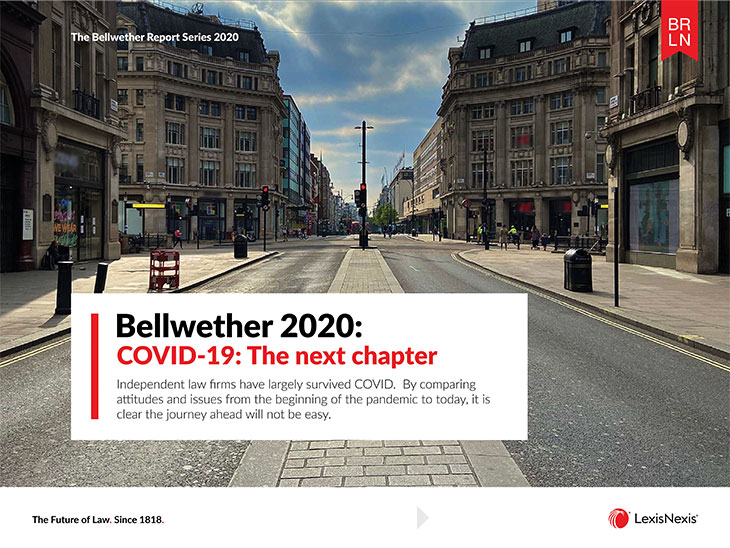
The report, ‘COVID-19: the next chapter’, by LexisNexis, is the second Bellwether to study the impact of the pandemic. The survey was conducted with 120 lawyers at firms with fewer than 21 fee-earners. It found that, six months on from the first lockdown, the worst effects have started to lessen and four out of five firms now believe they will be in business for the long term.
However, 23% are implementing cuts, compared to only 4% during the first lockdown.
Brexit and regulatory compliance continue to weigh heavily on lawyers’ minds. However, nearly half the respondents said Covid was their biggest worry (down from 63% in the previous 2020 Bellwether) and, with home working now the norm, 58% said staff welfare was their biggest concern.
The move to home working has been largely successful. However, it has led to feelings of isolation and a lack of motivation for three out of four lawyers. Despite this, more than two-thirds of the lawyers surveyed believed their work quality had improved or stayed the same.
One of the challenges of home working is lack of communication or miscommunication. Only one quarter saw this as a problem back in March, when home working was just getting underway. In this second survey, however, this number had risen to 44%, suggesting it is an urgent business problem for firms.
The report found: ‘Lack of management direction and supervision were also considered to be increasing issues since the first lockdown.
‘Young lawyers, in particular, who perhaps typically rely on colleagues for morale and training, said they were feeling increasingly isolated as the crisis has deepened.’
Some 40% of firms were changing their practice base to become either more generalist or more specialist, with the majority of these choosing to specialise.
Marin Daley, small law lead at LexisNexis, said: ‘Law firms have worked exceptionally hard over the last six months to continue practicing and supporting their clients. The relief and positivism in this latest Bellwether is notable. However, it is clear that with one problem receding, the future is still uncertain.’
View the full Bellwether report at: www.lexisnexis.co.uk/Bellwether2020.









